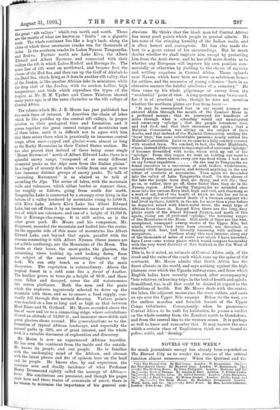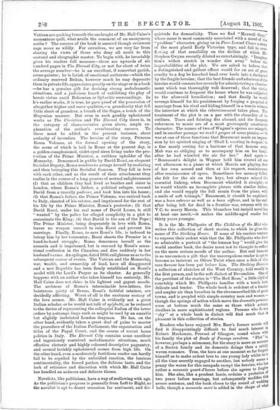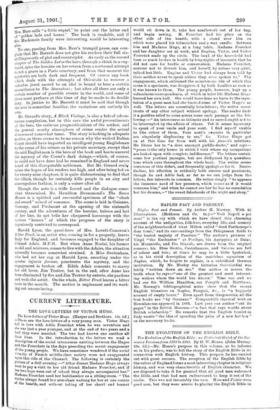NOVELS OF THE WEEK.* So much journalistic energy has already
been expended on The Eternal City as to render the exercise of the critical function almost unnecessary. When the Quirinal and the * (1.) The Eternal City. By Hall Caine. London : W. Heinemann. [6e.)— (2.) ,Four•Leaved Clover. By Maxwell Gray. London : W. Heinemann. [6e,J —(3.) The Striking Hours. By Eden Philipotte. London : Methuen and Co. 161—(4.) Souls of Passage. By Amelia E. Barr. London : T. Fisher Dnwin. ge. —(5.) The Golden Lotus. I3y Alfred Barrett. London : John Macqueen. 6e. —(6.) d Black Vintage. By morice Gerard. Loudon Digby, Long, and Co. fee.]—(7.) The Seven Houses. By Hamilton Drummond. London: Ward, Lock, and Co. [6e.]—(8.) Bitter Fruit. By Kra. Lotett-Cameron'. London : John Long. [Cal
Vatican are quaking beneath the onslaught of Mr. Hall Caine's momentous quill, what avails the comment of an anonymous scribe ? The success of the book is assured though reviewers rage never so wildly. For ourselves, we are very far from sharing the views of those who deny all merit to this orotund and oleographic master. To begin with, he invariably gives his readers full measure—there are upwards of six hundred pages in The Eternal City, or not far short of twice the average number—he is an excellent, if somewhat garish, scene-painter; he is lavish of emotional outbtirsts—which the ordinary reserved Briton, however much he may deprecate them in private life, appreciates greatly on the stage or in a book —he has a genuine gift for devising strong melodramatic situations, and a judicious knack of exhibiting the play of heroic virtue amid Bohemian or Sybaritic surroundings. In h's earlier works, it is true, he gave proof of the possession of altogether higher and rarer qualities,—a grandiosity that fell little short of grandeur, a breath of the Sagas, a touch of the Hugonian manner. But even in such gaudily upholstered works as The Christian and The Eternal City there is, in the category of characteristics given above, ample ex- planation of the author's reverberating success. To these must be added, in the present instance, sheer audacity of invention. The heroine of the story, Princess Roma Volonna, at the formal opening of the story, the scene of which is laid in Rome at the present day, is a golden-complexioned, violet-eyed siren living under the pro- tection of the Prime Minister, a ruthless upholder of the Monarchy. Denounced in public by David Rossi, an eloquent Socialist Deputy, Roma resolves to avenge herself by enslaving and then betraying this Socialist Samson. They fall in love with each other, and as the result of their attachment they realise in the course of a long process of mutual enlightenment (1) that as children they had lived as brother and sister in London, where Roma's father, a political refugee, rescued David from a rascally padrone, and took him into his house ; (2) that Roma's father, the Prince Volonna, was enticed back to Italy, cheated of his estates, and imprisoned for the rest of his life by the Prime Minister, Roma's protector; (3) that David Rossi, under his real name of David Leone, is still " wanted " by the police for alleged complicity in a plot to assassinate the King; (4) that David is the son of the Pope I The Prime Minister, being desperately in love with Roma, leaves no weapon unused to ruin Rossi and prevent his marriage. Finally, Roma, to save Rossi's life, is induced to betray him by her tormentor; Rossi shoots the Premier in a hand-to-hand struggle ; Roma denounces herself as the assassin and is imprisoned, but is rescued by Rossi's sensa- tional confession in the Chamber, and dies suddenly in her husband's arms. An epilogue, dated 1950, enlightens us as to the subsequent course of events. The Vatican and the Monarchy, war, wealth, and ownership of land, have all disappeared and a new Republic has been firmly established on Rossi's model with the Lord's Prayer as its charter. As generally happens with an author who takes himself too seriously, Mr. Hall Caine does not shine in his lightest and gayest moods. The archness of Roma's interminable love-letters, the boisterous gaiety of Bruno, Rossi's faithful retainer, are decidedly afflicting. Worst of all is the unctuous ecstasy of the love scenes. Mr. Hall Caine is evidently not a great Italian scholar, or he would not talk of spighetti, or be reduced to the device of representing the colloquial Italian of the lower orders by a strange lingo such as might be used by an amiable but slightly inebriated London drayman. He has, on the other hand, evidently taken a great deal of pains to master the procedure of the Italian Parliament, the organisation and titles of the Papal Court, and the course of recent home politics in Italy. The Eternal City contains some excellent and ingeniously contrived melodramatic situations, much effective rhetoric and highly coloured descriptive pageantry, and several lavishly upholstered scenes from high life. On the other hand, even a moderately fastidious reader can hardly fail to be repelled by the unbridled emotion, the luscious sentimentality, the forced pathos, the dubious taste, and the lack of reticence and discretion with which Mr. Hall Caine has handled an arduous and delicate theme.
Novelists, like politicians, have a way of mellowing with age. As the politician's progress is generally from Left to Right, so the novelist is apt to desert sensation for sentiment, and dis- quietude for domesticity. Thus we find "Maxwell Gray whose name is most commonly associated with a novel of the "problem" character, giving us in Four-Leaved Clover a story of the most placid Early Victorian type, and fall to over. flowing of that sensibility on the decline of which Mr. Stephen Gwynn recently dilated so entertainingly. "Imaging. tion's widest stretch in wonder dies away " before the improbabilities of the plot. We are asked to believe that a distinguished and gallant officer would for an act of gross cruelty to a dog be knocked head over heels into a duckpond by the fragile heroine; that the best friends and admirers of the heroine would censure her severely for administering a chastise- ment which was thoroughly well deserved ; that the victim would continue to frequent the house where he was subjected to the aforesaid humiliation ; and that finally he would revenge himself for his punishment by forging a proposal of marriage from his rival and hiding himself in a tree to witness the interview at which the eclaircissement takes place. The treatment of the plot is on a par with the absurdity of its outlines. Tears and fainting fits abound, and the frequent references to music are of a most grotesquely amateurish character. The names of two of Wagner's operas are misspelt, and in another passage we read is propos of some picnics:—"It was at one of these functions that Beaumont made an impres- sion by his spirited singing of Shall I, wasting in despair,' to a fine manly setting for a baritone of that famous song. Mab was so obliging as to accompany him on her banjo, after he had whistled the air for her." And again :— " Beaumont's delight in Wagner held him riveted all one wet afternoon to a piano at which Marcia sat playing, first of her own accord and then at his request, reminiscence after reminiscence of opera. Sometimes her memory failed, she felt for the air on the keys, but always missed the essential linking, when Beaumont whistled it straight; or he would whistle an incomplete phrase with similar failure, and she would supply the full strain from the piano, with a smile of soft triumph." Beaumont, it should be explained, was a beau sabreur as well as a beau esifteur, and in the end, after being left for dead in a frontier war, returns with the V.C. to marry Marcia. This blameless but insipid novel has at least one merit,—it makes the middle-aged reader feel thirty years younger.
It is the Mr. Phillpotts of The Children of the Mist who writes this collection of short stories, to which he gives the name of The Striking Hours. If some of his readers venture to express their ardent wish that the Mr. Phillpotts who drew so admirable a portrait of "the human boy ".would give the world another book, the desire must not be thought to reflect on the more serious moods of the author, But real humour is so uncommon a gift that the unscrupulous reader is apt to become as insistent as Oliver Twist when once a dish of this rare flavour has been put before him. The Striking Hours is a collection of sketches of the West Country,. told mostly in the first person, and in the soft dialect of Devonshire. One of the prettiest of the stories is " The Red Rose," a little idyll of courtship which Mr. Phillpotts handles with a touch both delicate and tender. The whole book is redolent of a fresher and ampler air than breathes in the circumscribed life of great towns, and is peopled with simple country men and women.— though the springs of action which move the dramatis personae seem at bottom much the same as those which actuate dwellers in more sophisticated regions. Persons who do not " shy " at a whole book in dialect will find much that is pleasant in this collection of stories.
Readers who have enjoyed Mrs. Barr's former novels will find it disappointingly difficult to feel much interestm Robert Mackenzie, Provost of Glasgow, round whom with his family the plot of Souls of Passage revolves. " Plot" is, however, perhaps a misnomer, for the story is more an account of a Scotch family and its domestic doings than a subtly woven romance. True, the hero at one moment so far forgetts himself as to make ardent love to one young lady whilst he Is all the time secretly engaged to another, but nobody seems a penny the worse for this escapade except the heroine, who has rather a mauvais quart-d'heure before she agrees to forgive him. She also, like a prudent lassie, ordains a probation bells, though a memento marl is added in the shape of what
before pbation of severe sentence, and the book closes to the sound of swag be but subsequently modifies this
two years fore marriage, Mrs. Barr calls " a little sequel," to point out the latter end of == golden lads and lasses." The book is readable, and if the Mackenzie family were interesting, would be interesting
also. No one, passing from Mrs. Barr's tranquil prose, can com-
plain that Mr. Barrett does not give his readers their full six- shillingsworth of plot and counterplot. As early as the second chapter of The Golden Lotus the hero, through a chink in a cup- board, spies the heroine on her return from a nocturnal attempt to rob a grave in a Paris cemetery, and from that moment the mysteries are both dark and frequent. Of course any book which deals with the attempts of Orientals to recover a valuable jewel sacred to an idol is bound to bear a certain resemblance to The .Moonstone; but after all there are only a certain number of possible events in the world, and some of them must perforce at this time of day be made to do double duty. In justice to Mr. Barrett it must be said that though the aria is somewhat familiar, the variations are entirely his own.
Mr. Gerard's story, A Black Vintage, is also a tale of adven- turous complexion, but in this case the awful presentiments of the hero, the ominous prognostications of the author, and the general murky atmosphere of crime render the actual denouement somewhat tame. The story is lacking in adequate motive, as there seems to be no reason why the wicked Italian Count should have imported an intelligent young Englishman to the scene of his crimes as his private secretary, except that the said Englishman is the hero of the book and has to unravel the mystery of the Count's dark doings,—which, of course, he could not have done had he remained in England and never Leard of this disreputable nobleman. But Mr. Gerard nary raises the hopes of his readers too high, and after being led on for twenty-nine chapters, it is quite disheartening to find that the villain, though he certainly kills people in an airy and unscrupulous fashion, is only a coiner after all.
Though the note is a trifle forced and the dialogue some- what thrasonical, Mr. Hamilton Drummond's The Seven Houses is a spirited and successful specimen of the "cloak and sword" school of romance. The scene is laid in Guienne, Gascony, and Piedmont at the opening of the sixteenth century, and the adventures of the heroine, heiress and last of her line, do not belie her chequered horoscope with the various " houses " of which the progress of the story is ingeniously contrived to correspond.
Harold Lyon, the quasi-hero of Mrs. Lovett-Cameron's Bitter Fruit, is an artist who, coming in for a property, leaves Italy for England, and becomes engaged to the daughter of Colonel Adair, M.P.H. But when Anne Nerini, his former model and mistress, comes to live with the Adairs, the situation naturally becomes somewhat strained. A Miss Swetenham, who had set her cap at Harold Lyon, smarting under the spretae injuria formae, penetrates the mystery, and the engagement is broken off. Edith Adair consents to marry her old lover, Jim Trotter, but in the end, after Anne has been eliminated by fire and Jim Trotter by enteric, she pardons and weds the artist. On the whole, Bitter Fruit leaves a bitter taste in the month. The motive is unpleasant and its work- ing out unconvincing.




































 Previous page
Previous page